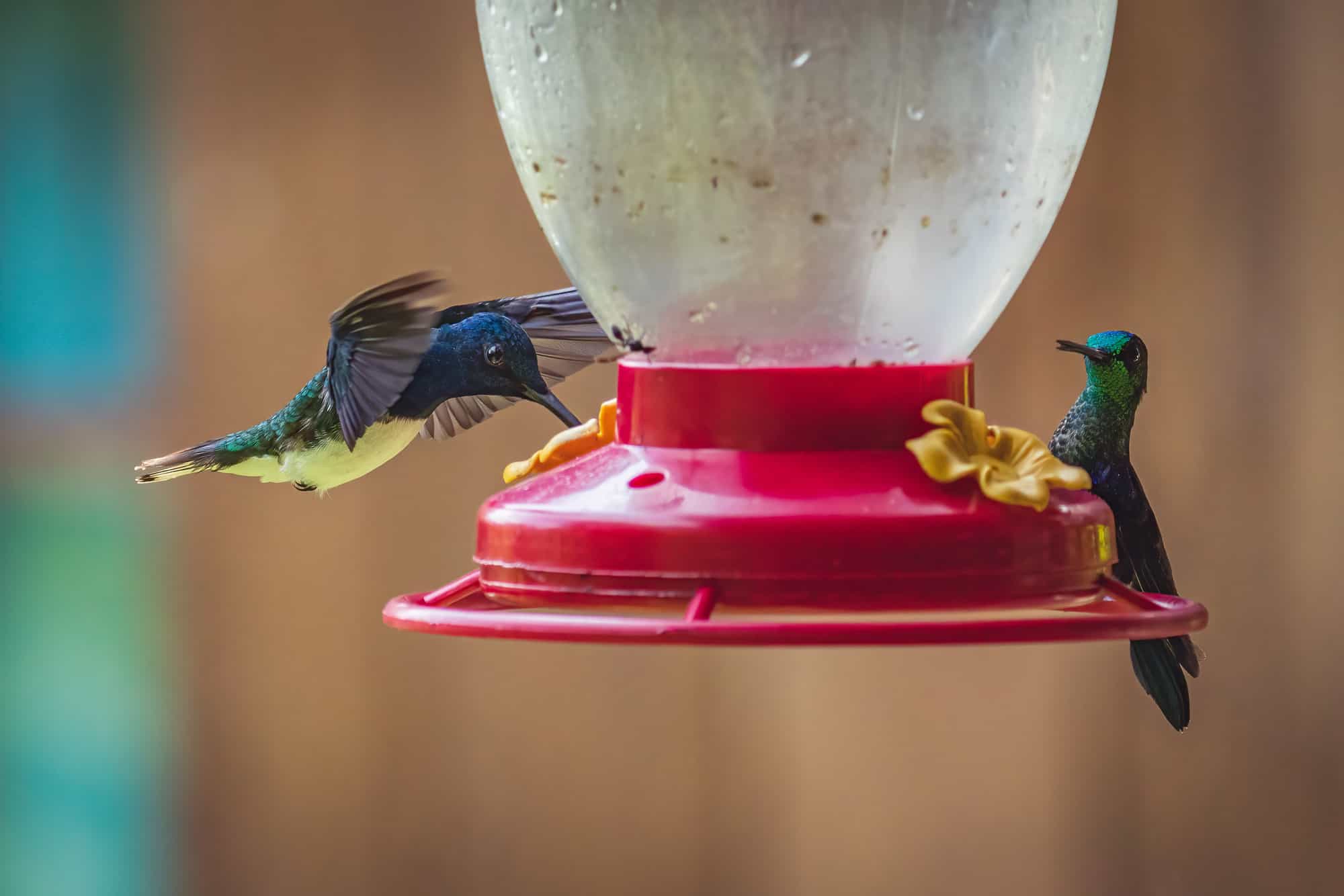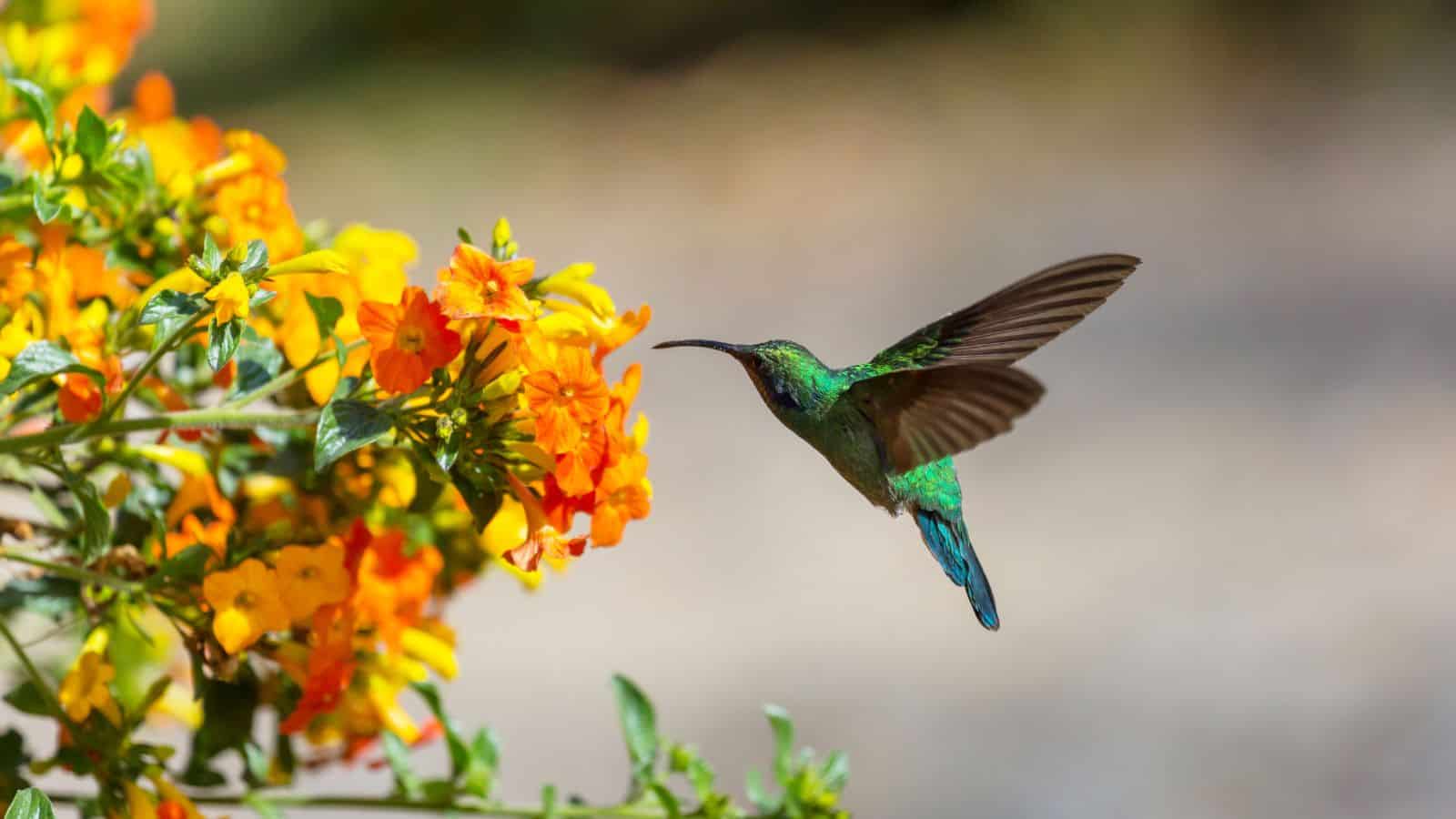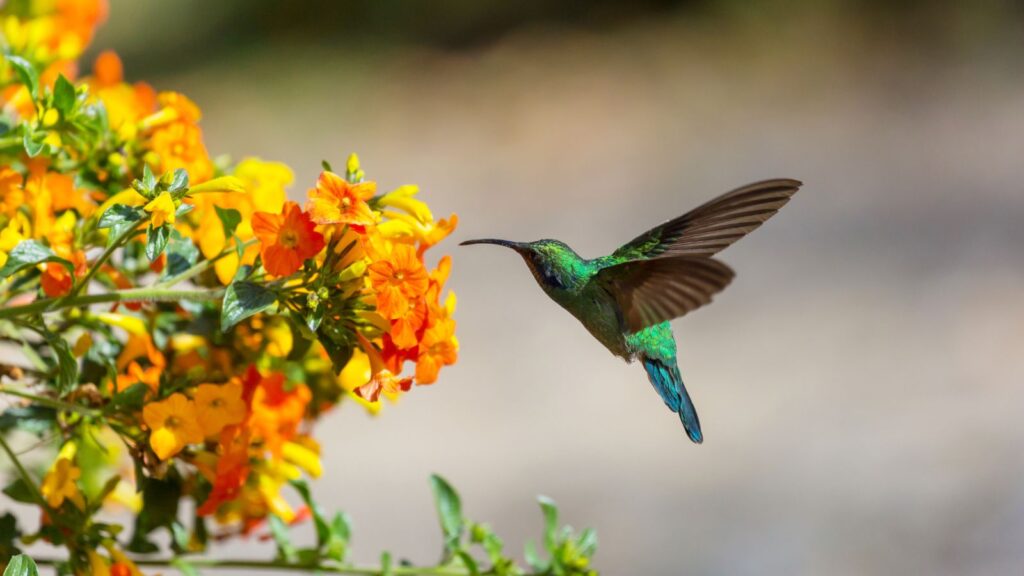Hummingbirds are tiny, colorful birds known for their acrobatics and charm.
Understanding what hummingbirds eat in the wild provides insights into how to best feed them in human environments. In their natural habitats, hummingbirds obtain their nutrition from two main sources: nectar-rich flowers and small invertebrates.
The specific flowers and insects they eat vary from one habitat to the next, but these core components of their diet remain the same. When they live near humans, hummingbirds will also eat nectar water from hummingbird feeders. Still, native plants provide the most natural food options for hummingbirds, and the best way to attract them to your yard is to plan plenty of flowering plants.
Understanding the Hummingbird Diet
Hummingbirds have a very high metabolic rate. They need to consume large amounts of food in order to maintain their active, energetic lifestyles.
Although their individual caloric intake is 3-7.5 calories per day, that is the equivalent of a human eating about 155,000 calories in a day!
Nectar is the central source of those calories, but they also get protein, vitamins, and minerals from spiders, gnats, aphids, and other small invertebrates.
The Role of Nectar in a Hummingbird’s Diet
Nectar gives hummingbirds the carbohydrates they need to power their busy lives.
Their long, slender beaks and tongues are adapted to retrieve nectar as they hover near flowers. They prefer flowers with a high concentration of sucrose, and they spot these plants by looking for colors that signal high sugar content. That means they are usually drawn to red, pink, yellow, and orange blooms.
To collect nectar, hummingbirds insert their long tongues into the bloom. The nectar sticks to their tongue, which they bring into their mouths before swallowing. They have special grooves on their tongues that trap the nectar.
Beyond Nectar: What Else Do Hummingbirds Eat?
Although nectar provides necessary carbohydrates, hummingbirds also consume insects for essential amino acids, vitamins, and minerals. By foraging on gnats, aphids, fruit flies, and spiders, hummingbirds obtain the protein and fat that they need.
This supplemental feeding is especially important during breeding season and for feeding nestlings. Baby hummingbirds rely on insects to provide needed nutrients not found sufficiently in nectar. Their mothers consume nectar and insects, then regurgitate it into their babies’ tiny bills.
Adults eat more insects while breeding, nesting, and migrating when energy needs are greater.
How Much Do Hummingbirds Eat in a Day?
That fast hummingbird metabolism requires a lot of food.
The exact quantities of their food intake are unknown, but most hummingbird species eat between 3 and 7.5 calories a day. This involves:
- visiting hundreds or even thousands of blooms daily
- consuming more than half of their body weight in nectar every day
- increasing their food intake in cold climates
- eating from dozens to thousands of insects
- feeding every 10-15 minutes throughout the day
- entering a state of torpor at night to conserve their energy
Additionally, hummingbirds eat more right after and right before they migrate.
Do Hummingbirds Just Drink Nectar or Water Too?
Hummingbirds get most of their hydration from the nectar that they drink, but they also drink water and bathe. They will sometimes “bathe” in light rain, and they will visit birdbaths as needed. They will drink the morning dew for hydration, too.
Feeding Hummingbirds: What Humans Can Do

Fans of hummingbirds can support these delicate but fierce backyard visitors by supplementing their diet with homemade or store-bought hummingbird nectar.
The easiest thing to do is to mix a 4:1 ratio of water to white sugar and fill a feeder! Nectar mixes are sold in stores, but plain sugar water is just fine.
Hummingbirds need native plants more than they need feeders, but feeders are still a great option. They are especially popular for window birdwatchers and those who don’t have a lot of space to grow a lot of flowers.
Here are some tips for feeding hummingbirds:
- Use a 4:1 ratio of water to white sugar
- Clean feeders every 2-3 days with hot water
- Place feeders in open areas away from bushes
If you really want to support hummingbirds, your best bet is to incorporate native plants into your gardens. This promotes better whole-body health in hummingbirds, as they get the most complete sets of nutrients through nature.
Is Sugar Water Bad for Hummingbirds?
There is no evidence that white sugar in proper concentrations harms hummingbirds. It can provide the carbohydrates they need and serves as an excellent supplement to native blooms.
The exact ratio of sugar to water that most closely matches natural nectar is still being researched, but a common blend is 1 part sugar to 4 parts water. White table sugar does not appear to have any adverse effects compared to natural nectar.
What To Feed Hummingbirds Besides Sugar Water
While sugar water is acceptable, hummingbirds may be healthiest with access to natural nectar sources. Native plants and flowers provide the best supplemental food option by mimicking their wild diet.
If you want to provide hummingbirds with access to insects that they need to survive, we recommend avoiding pesticides. In addition to killing off hummingbird sources of food, pesticides may make hummingbirds sick.
We recommend that you add the following hummingbird-friendly plants in your garden:
- Trumpet Vine
- Red Hot Poker
- Bee Balm
- Salvia
- Coral Honeysuckle
- Fuchsia
- Cardinal Flower
- Bleeding Heart
- Columbine
- Penstemon
- Red Sage
- Hollyhock
- Hummingbird Mint
- Petunia
- Scarlet Sage
- Lobelia
- Beardtongue
- Zinnia
- Honeysuckle
- Daylily
- Mexican Sunflower
- Trumpet Creeper
- Foxglove
- Agapanthus
- Yucca
Some Key Takeaways About What Hummingbirds Eat

In their natural habitat, hummingbirds meet their nutritional needs by feeding on flower nectar and small insects. While supplemental feeding can support hummingbirds, native plants and flowers create an ideal habitat by providing a balanced diet.
A hummingbird’s natural food sources provide them with the nutrients they need most: carbohydrate-rich nectar and protein-filled bugs. With thoughtful planting and proper feeders, yards can be transformed into a hummingbird’s paradise.
By meeting their needs for both insects and sugary nectar, humans can create an optimal supplemental feeding environment that mimics the bird’s wild preferences.
FAQs About What Hummingbirds Eat
Needing a quick overview of what hummingbirds eat? Check out our FAQs!
What Can I Feed a Hummingbird?
Hummingbirds can be fed white sugar-water mixtures, specialized commercial nectars, and insects like gnats or fruit flies. They also benefit from native plants that provide natural nectar sources.
Do Hummingbirds Eat Bird Seed?
Nope, hummingbirds do not eat traditional bird seed. They rely on nectar and insects for their diet. Bird seed does not provide the nutritional composition they require.
Can Hummingbirds Survive on Nectar Alone?
Hummingbirds can survive on nectar alone but do best with some insects in their diet as well. Nectar provides carbohydrates while insects supply protein, vitamins, and minerals.
Will Hummingbirds Eat Fruit? Do They Eat Apples or Bananas?
Hummingbirds do not typically eat fruit. That includes apples and bananas. Fruit simply does not offer the nutrition they need, and they might even become sick if they attempt to eat fruit. However, hummingbirds are smart enough to avoid foods that are not good for them.
What Does It Mean When a Hummingbird Visits You Daily?
When a hummingbird regularly visits a feeder or yard, it indicates they are getting the food they need and feel safe there. They return to reliable food sources from day to day and even year to year.
Where Do Hummingbirds Get Nectar?
In the wild, hummingbirds get nectar from colorful, tubular flowers. Favorite natural nectar sources include cardinal flowers, trumpet vines, and certain sage varieties.
What Do Hummingbirds Do With Sugar Water?
Hummingbirds drink sugar water for energy. It provides them with carbohydrates in place of natural flower nectar. They use it to fuel their metabolisms and power their flight.
How Much Does One Hummingbird Eat in a Day?
A hummingbird eats up to half its body weight in nectar each day. For a 3-4 gram hummingbird, that equates to .05-.07 ounces of nectar daily, spread across hundreds of feedings.
How Long Can Hummingbirds Go Without Eating? Do Hummingbirds Need To Eat Every 10 Minutes?
Hummingbirds need to eat frequently, approximately every 10-15 minutes during the day. They can go up to 12 hours overnight without eating by building up energy reserves. This period is called torpor.
How Often Do You Fill Hummingbird Feeders?
Hummingbird feeders should be cleaned and refilled every 2-3 days at the minimum. Cleaning with hot water and replacing nectar helps keep feeders safe by preventing the growth of bacteria or attracting too many insects like ants and gnats.
How Often Do Hummingbirds Need To Drink Water?
Hummingbirds get most of their water needs from nectar. They do not typically need to drink water separately. Providing a mister can supplement their water intake, and they may visit a small bath. Often, when they need hydration, they drink morning dew from the leaves of trees.
Do Hummingbirds Have a Routine?
Yes, hummingbirds follow predictable daily routines focused on feeding. They have set territories and visit familiar flowers and feeders at repeated times, as long as food is available.
What Do Hummingbirds Do at Night?
At night, hummingbirds enter a hibernation-like state called torpor to conserve energy. Their metabolisms slow down and body temperatures drop. To stay safe during this period, they perch in protected areas and avoid being detected.

